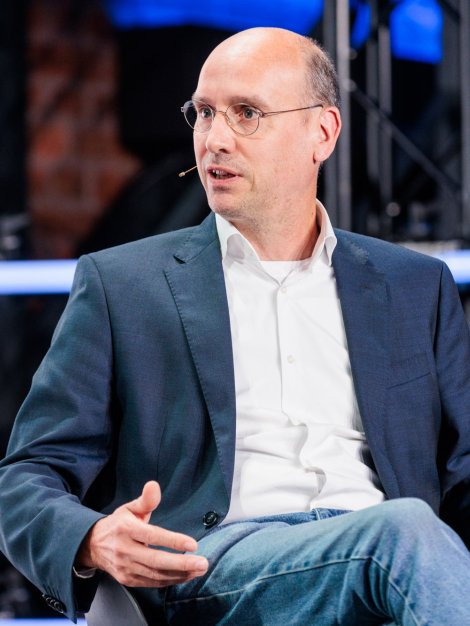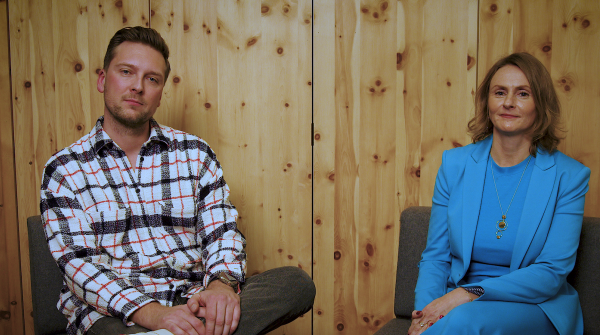What do the Olympics, the World Cup, Formula 1 and the Super Bowl have in common? That's right, they are the biggest sporting events in the world. And they are all implemented with communications technology from Wuppertal. Riedel Communications transmits the announcements of the referees in the NFL, enables the pit radio in Formula 1 and connects the FIFA referees with the analysts in the control center. Even when Felix Baumgartner jumped from the stratosphere to earth in 2012, it was Riedel's audio and video technology that transmitted the spectacular flight to a billion TV viewers. Besides sports, Riedel is also involved in show events like the Eurovision Song Contest or big music festivals like Wacken.
In our series "Challenges of a CEO", founder Thomas Riedel talks about the beginnings of his success story and reveals what it takes to convey the emotions of sports in the media.
"I started 36 years ago with classic event technology. At some point, I also started renting out radios. Radio technology was a niche in the 1990s. Right from the start, I was involved in sporting events, especially soccer and motor sports. The marshals had to communicate somehow with the drivers and race control. Of course, that was nowhere near as modern back then as it is today. Much of what is standard today, we have invented and developed over the years.
The first major sporting event at which I was on site with radio technology was the 1992 Olympic Games in Barcelona. Almost at the same time, I started working at the Formula 1 in Hockenheim. In both cases, these were initially small, national assignments. At the Olympics, I equipped the German House - which was not yet called that at the time - with radio technology, and in Hockenheim, I equipped the local race control. But when you're at an event like that, a couple of things inevitably happen: first, you get ignited by the atmosphere on site; second, you meet important people; and third, you learn what the procedures are like. That led to me quickly getting deeper into events and adding more jobs.
In the second half of the 1990s, more and more Formula 1 teams gradually came knocking - also because data transmission was added to voice communication. In the beginning, it was just Ferrari, to whom we sold a few devices. Then McLaren approached us. They had problems with communication and wanted to know what we were doing for Ferrari. I then put on a bit of a show and acted mysterious. That worked. McLaren said, 'Okay, if you don't tell us what you're doing for Ferrari, we'll assume you won't tell anyone what we're doing together then either.' That's one of the basic principles of success: in a competition - whether it's the Olympics, soccer or Formula 1 - you have to follow the rules of the game. And the same applies in business: confidential information remains confidential. Just imagine if the signals from the referees of the 1st and 2nd Bundesliga soccer leagues, which all converge at our control centre in Wuppertal, became public. That makes you realize the role we play in terms of confidentiality.
In the beginning, I just rented out radios. That was pretty trivial, it just wasn't done by anyone else. But over time, we learned as a team to develop specific solutions for certain applications. Take referees, for example: FIFA needed a radio that was small and light enough to wear on your wrist. It had to work anywhere in the stadium where thousands of cell phones, WiFi signals and wireless cameras interfere. And it had to withstand sweaty jerseys and rain. Our engineers developed and deployed the hardware and software. Such individual solutions are our USP. There aren't even a handful of companies in the world that do this.
Riedel Communications
The company, based in Wuppertal, Germany, is a leading global provider of live production tools in the media, sports and entertainment sectors. It was founded in 1987 by Thomas Riedel and today has annual sales of around 250 million euros. Riedel Communications equips more than 3,000 events per year with technology, develops new tools and supplies data communication networks for the broadcast, live event and corporate industries. More than 1,000 employees work on these projects at 30 locations in Europe, Australia, Asia and America.
Our second USP is service. Often, it's the little things that eventually turn into a bigger problem. Let's take the example of referees again: All it takes is for one of them not to check the battery, the thing goes out, and he has to interrupt the game or continue without communication. Stupid situation. Or there was an operating error and the referee didn't want to show his face. In the early days of referee communication, these were really common reasons why something didn't work on the radio. Now it would be much too costly to send a technician to every stadium. That's why we solved it with intelligence. It's now part of the procedure to talk to our control centre when you switch on the headset and check everything. We have created the conditions for this: We can monitor all the properties of the end device in Wuppertal, including battery status or position in the charger.
Similar special requirements had the America's Cup had similar special requirements for us. The organizers wanted live images from the sailboats, plus tracking signals. Seawater whips over the equipment, strong winds make communication almost impossible. A conventional microphone windscreen quickly gets soaked in water. But we have also developed solutions for this, which have made it possible to track the America's Cup in a level of detail that was previously unheard of. We have made the sport explainable and brought it to the people.
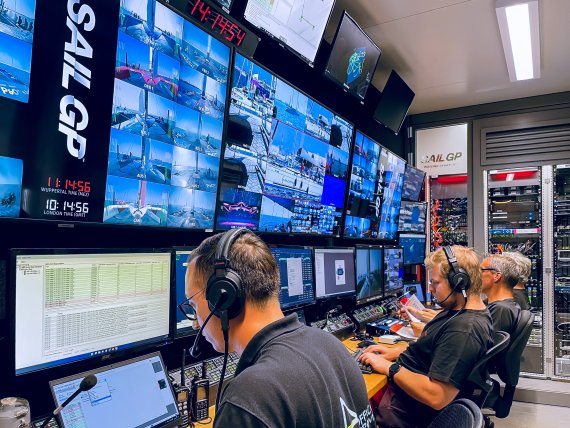
The most recent example is the SailGP Formula 1 as a water sport, so to speak. Until now, the team coaches have driven alongside the sailboats on 500-horsepower speedboats. The organizers no longer wanted that, if only because of sustainability. And it also had disadvantages for the coaches: On the water, you can't see the course of the race. So at the race in Los Angeles in July, as a test for the German and American teams, we set up a station on shore where the images from the helicopter and the onboard cameras are combined. The system makes it possible to jump back and forth, fast-forward and rewind, to be in dialogue with the boat. The coaches came up to us afterwards and said, 'This is a game changer!' Now, for the next races in Europe in September and October, we are setting up stations like this for all ten teams, similar to the pit lane in Formula 1. This has the side effect of changing live coverage as well, because the cameras can suddenly capture the emotions of the coaches. This example shows that technology can change the dramaturgy of a sport.
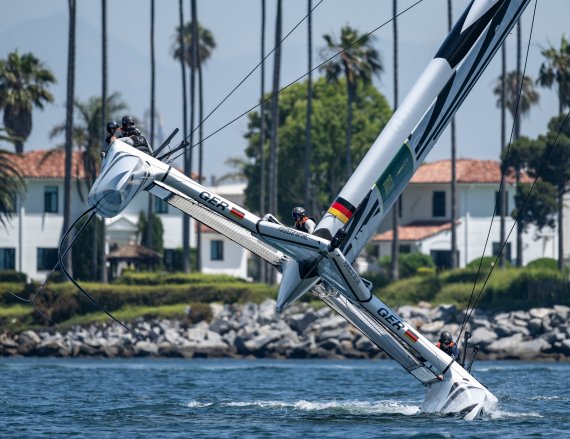
Being format-relevant in this way is something that motivates us. Firstly, the work is then much more fun, and secondly, money can be earned differently if you are important and relevant. Meanwhile, the big organizations and players come to us when they have a problem with wireless data transmission. That still drives me after 36 years. In fact, in the case of SailGP, so much so that I switched sides for the first time. Together with a few co-investors, I am the owner of the new German SailGP team. Sebastian Vettel, four-time Formula 1 world champion, is also involved. He was enthusiastic about the sport and the sustainability idea behind it right from the start and sits in on every meeting. And at the races, he exchanges ideas with the data analysts at the top level.
Now I can optimize the series not only from the outside, but also from the inside, and contribute technical ideas. Of course, for Thomas Riedel, a private citizen, it's once again a question of playing by the rules - as it was in Formula 1. For me, that's a question of morale, of sportsmanship. When competing on the water, I want to win with the German team. But when it comes to developing the sport further behind the scenes, we as Riedel are involved in the interests of everyone. And the other teams agree with that, too.
SailGP
SailGP is an international sailing race series featuring high-performance F50 catamarans that can reach speeds of up to 50 knots (approximately 93 km/h). The series was first launched in 2019 and offers exciting competitions in some of the most beautiful harbours in the world. Participating teams represent various countries, including the United States, Australia, the United Kingdom, New Zealand, France and, since 2023, Germany. SailGP races are short, intense and offer spectacular action as the catamarans fly over the water with their foils.
As shareholder of Sportdeutschland.TV I'm very keen to help sports that are away from the mainstream media spotlight. What can change that is a certain entertainment factor. Here, too, technology can help bring the fascination of sports closer to the audience, be it through digital balls or sensor technology in rackets. And that's also interesting for the athletes. An app could be used to control and train trajectories or stroke angles. About the start-up platform leAD start-up platform, we are supporting a number of exciting projects.
We are also working on a camera that is so small that it can be flanged to the communication systems of soccer referees. This would make it possible to see live images from the referees' point of view and relieve them if they had no insight into a situation.
Next year, I'm really looking forward to the Olympic Games in Paris. We'll be at all the venues there and run a communications sports business lounge ourselves, where we want to bring people together on the topics of sports and technology. Directly after that, the America's Cup will take place in Barcelona and our second season with the German SailGP boat will start. And then, of course, the European Football Championships in Germany and all the ongoing projects such as Formula 1, Bundesliga, NFL, MLB, PGA, and so on. That's quite a program. Plus projects that come up at short notice. For us, the year will again be adrenaline at a stretch.
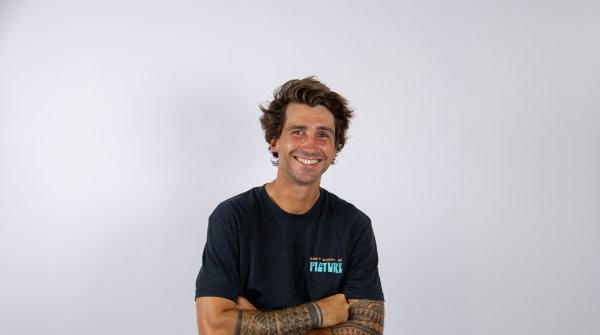
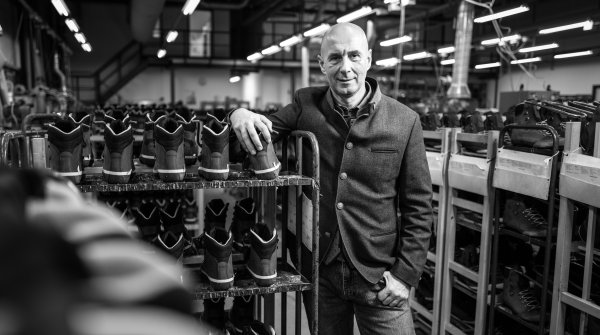 Sports Business"This is not a shoe, this is state-of-the-art!"
Sports Business"This is not a shoe, this is state-of-the-art!"
- Awards
- Mountain sports
- Bike
- Fitness
- Health
- ISPO Munich
- Running
- Brands
- Sustainability
- Olympia
- OutDoor
- Promotion
- Sports Business
- Textrends
- Triathlon
- Water sports
- Winter sports
- eSports
- SportsTech
- OutDoor by ISPO
- Heroes
- Transformation
- Sport Fashion
- Urban Culture
- Challenges of a CEO
- Trade fairs
- Sports
- Find the Balance
- Product reviews
- Newsletter Exclusive Area
- Magazine
